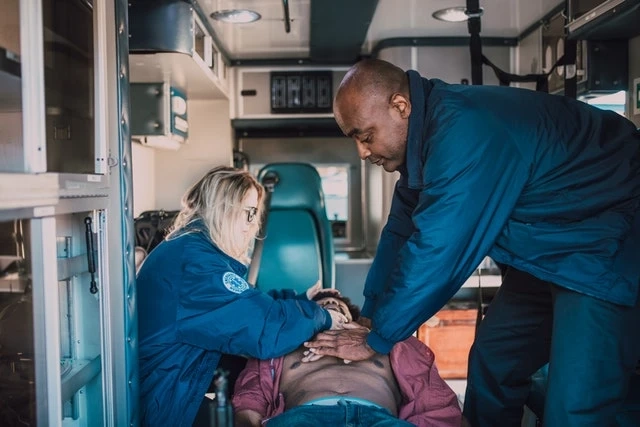The signs and symptoms of acute coronary syndrome, also known as angina, often mimic those of other heart conditions that aren't as serious. The most common causes of acute coronary syndrome are plaque buildup inside the arteries and heart attacks, but other factors can also contribute to this potentially dangerous condition.
Read on to learn more about some of the contributing factors of acute coronary syndrome and how you can help as a CPR and ACLS certified instructor.
What Is An Acute Coronary Syndrome?
Acute coronary syndrome (ACS) is the medical term for a heart attack. It happens when one or more of the arteries that feed your heart muscle is blocked, and the blood flow to your heart is cut off. When this happens, an area of your heart is starved of oxygen, which can cause permanent damage.
Who Is At Risk For Acute Coronary Syndrome?
Anyone can develop ACS, but it's more common in men and people who are older than 65 years of age. Atherosclerosis, the buildup of plaque in the artery walls, is one factor that may increase risk.
Other factors include:
High blood pressureHigh cholesterol levelsSmokingDiabetesObesityThe first sign of ACS is chest pain or discomfort that lasts more than a few minutes or goes away and returns. The pain may feel like pressure or a squeezing sensation in the chest; it might also feel like an uncomfortable sensation in the neck, jaw, or arm. Some people also experience shortness of breath with or without chest pain; lightheadedness; nausea; vomiting; sweating; and rapid heart rate (tachycardia).
Symptoms
Symptoms of acute coronary syndrome can vary but are often serious. They can include:
Chest pain or discomfort in the form of a tight, heavy feeling that may radiate to the left arm, neck, jaw, or back. This pain may worsen when you take a deep breath or move around.Shortness of breathNausea and vomitingLightheadedness or dizzinessEven if they seem to go away, it's important to call the doctor as soon as possible. The best treatment for an attack of acute coronary syndrome is with medication such as nitroglycerin tablets and aspirin.
How Is Acute Coronary Syndrome Diagnosed?
It can be difficult to diagnose ACS, as it shares many symptoms with other illnesses. Suppose you're experiencing chest pain or discomfort. In that case, it's important to seek medical attention immediately and tell the doctor about recent lifestyle changes, such as quitting smoking or starting a new exercise routine.
The doctor will ask questions about medications and the frequency of chest pain, how long it lasts, what brings on the symptoms, what relieves them, and if anything triggers these episodes.
Tests involved in diagnosing ACS:
An electrocardiogram (EKG)may be done to check for signs of heart rhythm disturbances that could indicate a heart attack.A stress test involves increasing your heart rate with exercise and checking for any irregularities.X-rays look for clots in the arteries that feed blood to the heart muscle. They also measure calcium levels in bones, an indicator of risk factors, including diabetes and high cholesterol levels.A CT scan provides an image of all areas of the heart, which might show blocked arteries or signs of plaque buildup around the valves that direct blood flows through different body parts.MRI scans use powerful magnets and radio waves combined with computer technology to produce images of areas inside your body without using x-rays.How Can A BLS And ACLS-Certified Individual Help In This Medical Emergency?
A person with acute coronary syndrome may have severe chest pain that lasts more than a few minutes, feels worse with rest, and is often accompanied by nausea and shortness of breath. It can be a life-threatening emergency. If you see someone experiencing these symptoms, call 911 immediately.
If you're an Advanced Cardiovascular Life Support certified personnel, you can help the person while you await emergency medical professionals' arrival. Focus on the ABCs: Airway, Breathing, and Circulation.
Stay calm and reassure the personas you support their head, neck, and shoulders.Position them on their back, raising their legs if they are unresponsive.Place one hand under their head for support; place your other at their sternum for compressions and breaths - about 100 per minute.Rescue breathing should last 1 second. Other helpful interventions include calling family members and administering oxygen via mask or bag valve mask device (BVM).
What Is The Prognosis For Someone With Acute Coronary Syndrome?
Acute coronary syndrome is a sudden blockage of one or more coronary arteries. The prognosis for someone with acute coronary syndrome is often good, but it depends on the cause and extent of the heart attack.
If the person survives and doesn't have severe damage to their heart muscle, they may be able to recover completely. However, the prognosis can be much worse if there is extensive damage to the heart muscle. It also depends on whether or not any risk factors could lead to another heart attack in the future.
Some people with acute coronary syndrome have further episodes called re-infarctions, where parts of their damaged heart muscles die off over time because blood flow wasn't restored quickly enough during their initial recovery from the first episode.
Register For Top-Quality ACLS Certification
If you’re unsure how to help someone dealing with ACS, register for Advanced Cardiovascular Life Support (aha acls certification) certification that CPR, ACLS & PALS Training Institute offers. Their training and certifications equip you with the skills you need to respond to a medical emergency.
In addition, they also offer cpr classes near me and Pediatric Advanced Life Support (pals certification online).
Take a look at their calendar and register for their upcoming class.
Get in touch with them today to learn more!
About The Author
The author is an AHA-certified CPR class instructor. He has been giving first aid and CPR training for over a decade. He's currently working with CPR, ACLS & PALS Training Institute and trains emergency responders to act appropriately in medical emergencies.


